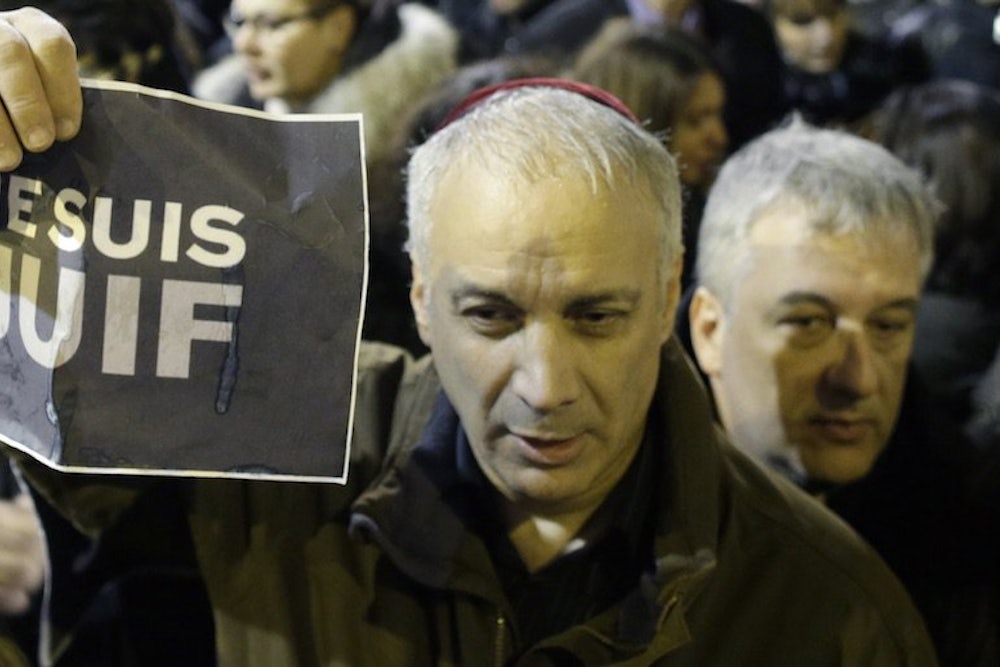“France without Jews is not France.” French Prime Minister Manuel Valls’s words in response to the recent terrorist attack on a kosher supermarket in Paris have become the touchstone for those trying to make sense of France’s reaction. The discussion thus far has centered on whether the country will make good on its promise to protect its Jews (Seth Mandel and Robert Zaretsky have doubts), and on whether France is being preferential to its Jews, to the detriment of its Muslims (see James McAuley in The New Republic). The consensus, though, appears to be that Valls’s remarks were, as the saying goes, good for the Jews.
But is it really such an unambiguous positive for French Jews that they're being declared integral to the French nation? Because that is, in effect, what Valls is saying. In an interview with The Atlantic's Jeffrey Goldberg, Valls offered a longer version:
“The choice was made by the French Revolution in 1789 to recognize Jews as full citizens,” Valls told me. “To understand what the idea of the republic is about, you have to understand the central role played by the emancipation of the Jews. It is a founding principle.”
Valls, a Socialist who is the son of Spanish immigrants, describes the threat of a Jewish exodus from France this way: “If 100,000 French people of Spanish origin were to leave, I would never say that France is not France anymore. But if 100,000 Jews leave, France will no longer be France. The French Republic will be judged a failure.”
These remarks, while probably well intended, are actually quite frightening. They’re a continuation of the French tradition of treating Jews as an idea—as representing liberalism, secularism, tolerance—rather than as people. Valls isn’t merely saying (as he should!) that Jews should be safe in France. He’s suggesting that the French nation hinges on the presence of one minority. He’s affirming the idea that Jews should be held up as symbols of the Republic.
Jews’ tremendous symbolic role in modern France predates any issues relating to the Israeli-Palestinian conflict or the Second World War, and is well established in scholarship. During the Enlightenment and 1789 Revolution, as historian Ronald Schechter has shown, debates about the limits of French identity centered on the question of whether a Jew could be French. In the mid-19th century, Lisa Moses Leff has demonstrated, Jews represented liberalism, while in colonial Algeria (see Joshua Schreier), Jewish policy was deeply wrapped up with French imperial strategy. And during the Dreyfus Affair (1894-1906), French intellectuals fought amongst themselves, ostensibly over the innocence of a Jewish army officer accused of treason, but really over the legacy of the Revolution. While individual Jews, of course, sometimes took part in these discussions, the place of The Jews has consistently been far greater than that of actual Jewish people.
Here’s where things get tricky: Sometimes the disproportionate attention French Jews have gotten has been positive. One part of the French ideological spectrum—the pro-Republic, pro-1789-Revolution, pro-Dreyfus, pro-Resistance side, or what might be called the center-left—has long viewed Jews as symbolizing the desired France: a secular nation where minorities assimilate. This, it would seem, is where Valls is situating himself.
Meanwhile, the other France has long taken the position, not particularly uncommon in Europe, that Christianity and ethnic origins trump all, thus making Jews—no matter how assimilated—permanent outsiders. For that France, Jews’ emancipation during the Revolution marked the beginning of the end. The decision that someone without deep ancestral roots on French soil could be French had fundamentally changed French identity, opening up the possibility that other Others could follow suit.
While the second France is more straightforwardly anti-Jewish, the first one also poses problems. French secular Republicans will embrace the idea of The Jews, only to end up frequently disappointed with the reality, namely that Jews are human beings, not concepts. This is something I found in my dissertation research (some of which was recently published here) on Jewish intermarriage in nineteenth-century France. While non-Jewish writers and politicians enthused about the idea of Jews marrying into the general population, they were less keen regarding the possibility of a Jew as an in-law or spouse. Moreover, the first view is progressive only insofar as it believes Jews can and will shed all difference (except for religious difference, but where does “religion” end?) so as to become French.
It's been a mixed blessing at best that Jews represent the Republic. It puts Jews ahead of Muslims in the privilege hierarchy, but also places them in a sometimes-disastrous intermediary position. As the supermarket attack demonstrated, it means that Jews—by merely existing—are at the front lines of attacks against the Republic. This was also true, of course, during the Second World War and the Dreyfus Affair. French Jews are caught in the crossfire of every Franco-French war, while at the same time representing the French oppressor to other Others.
Embodying your country’s national self-conception is a burden—something like being a so-called model minority, but on a far greater scale. French Jews, like all other French men and women, deserve security from the French government. Any special role above and beyond that will only backfire.
